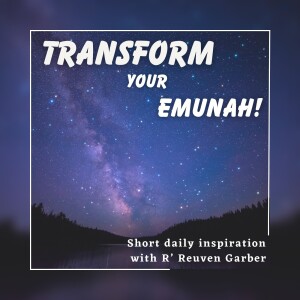
Sunday Oct 06, 2024
155 - 360° Turnabout
The Aseres Yemei Teshuvah provide us a special opportunity. The Gemara teaches that completely righteous individuals are judged for life and blessing on Rosh Hashanah itself, as well as completely wicked individuals are judged on Rosh Hashanah itself for the opposite, whereas most individuals fall into the category of Beinonim, where their judgment lingers until the holy day of Yom Kippur.
Hashem has given us the special days of Aseres Yemei Teshuvah, and now specifically these days between Rosh Hashanah and Yom Kippur, in order to make our maximum effort to repent for any sins we might have committed, and be'ezrat Hashem tip the scales to positive and sweet blessings for our judgment. Hashem knows that we are going to sin, because if He wanted a world without sin, it would have been given to angels who don't have an evil inclination. Hashem specifically desired a world where we do have the opportunity to sin and mess up, and nevertheless, one of the greatest gifts that we have been given is the gift of Teshuvah.
Let us stop for a moment and just try to internalize the incredible opportunity of Teshuvah. When one takes a very dirty item of clothing and gives it a really good wash, and it comes out super clean, it is very easy to notice the difference of how the item was when it was dirty, to how it is now once it's been cleaned. That is not how Teshuvah works.
When we do Teshuvah, for the most part, we do not necessarily feel the difference, however once again, we are called on to believe what we are taught about Teshuvah. The Gemara teaches us that when a person commits a sin, and thereafter does Teshuvah out of their love for Hashem in the best way that they can, that sin actually changes on their record to a mitzvah. This is a most fascinating kindness that Hashem has done for us. It is so motivating and inspiring to know that we have these days now specifically to think about all of our actions, where we might have messed up, and where we can improve, and if we do so, to the best of our abilities, those aveiros will actually change into mitzvos.
It is also important to highlight that Hashem does not expect us to make a better Teshuvah than our human capacity allows. And although there are many levels to Teshuvah, much of the time, a simple process, just acknowledging where we might have gone wrong, and then rectifying the situation, if anything can now be done, and resolving to try our best in the future, can work wonders.
"Hashem, my Father, there were many times this year that I was not careful enough with my speech. Although I might not have gone out intentionally to speak Lashon Hara and say nasty information about other people, there were times that I laughed at a funny joke about another individual, which also falls under the category of Lashon Hara. Hashem, I'm really sorry for doing so, and the truth is that that sin also comes from a lack of my emunah, because I didn't feel it was so bad what I was doing. Because why is it so bad? It was just a funny joke. But at the end of the day, I don't want to live my life based on what I think and my logic, but rather, based on emunah in you, and if you have told me that this is a serious transgression, then there is nothing else to talk about, and I want to believe that with all my heart. Please, Hashem, help me to.
I am going to try my best for future situations, from right now onwards, that even though it might sometimes be uncomfortable, and others might be laughing at the joke that was mentioned, I will try my best to be strong, even when it makes me look funny. Thank you so much, Hashem, for the incredible gift of Teshuvah and the opportunity to turn my aveiras into mitzvahs."
No comments yet. Be the first to say something!